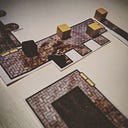Don’t Hold Back in Fate Core
Well, another session of Fate Core (our #atreusfate game’s second actual mission) behind us, and the after-game thoughts are running wild. The topmost today is that I have to admit that I’ve been going too easy on my players until this point.
Now, when I say easy, I’m not talking about difficulty levels, although my rule of thumb of “if it should be something they can do, roll at +2” is quite generous. What I mean is that I’ve not pushed enough when it comes to Successes with Costs and Failures. Yesterday I ran a game where I really made failing a roll a really bad thing, and that actually worked great. So, in light of my revelation, here’s what I’m thinking now.
Fate is supposed to be dramatic. It says so right on the box when creating characters — The characters are proactive, competent, and dramatic. And to that effect, when we roll the dice and spend the Invokes, we aren’t doing it to see if we did just ok, or if the result wasn’t really that good. We’re making Actions to see our characters embody those three character ideals. Proactivity and competence we usually remember to bring in, especially with Successes. We are great in describing how our dudes and dudettes manage to perform cinematic feats that would fit right in a Michael Bay movie. But when it comes to Failure, we (or well, at least I) tend to forget the drama.
Compels
Compels are the simplest places to bring dramatic change to the game, because, again, we’ve been clearly instructed to do so:
If you’re in a situation where having or being around a certain aspect means your character’s life is more dramatic or complicated, someone can compel the aspect.
That’s easy to remember. When someone is compelled or if they suggest a self-compel, bring on the drama. If the spymaster character’s I haven’t been on the field in a long while Aspect gets compelled, the result shouldn’t really be something like “well, you don’t get everything you want because you’re not on top of your a-game”, but more along the lines of “because of your overconfidence in your skills, important people get killed”. Pushing the characters’ Compels to the dramatic limits pushes the story in interesting directions.
Failures
With Compels, it’s easy to reason the pushing to the extreme with Fate Point Economy — you have to pay your narrative price for that Point, and it never should be a walk in the park. But with Failures, it’s easy to slip into the mindset of “ok, you don’t manage to do that” as there’s no mechanical price to pay, and the player has opted not to take the Success with a Major Cost option.
All Actions are potential places for expending Fate Points, and the question is “is this something I want to spend my limited resource on”. To approach the question of a Failure with this in mind, the result should be something that the character doesn’t want. If the Failure is something dull, why should the player spend their precious Fate Point to avoid that.
So, when the hotshot Mech pilot tries to get the Aerospace ace to go on a date, the Failure shouldn’t be just “sorry, not today”, but “oh, honey, I already have a date for the night”, a bruise on the ego of the character and a potential love triangle in the future.
Success with a Major Cost
Now, with Success with a Minor Cost, a somewhat undramatic cost can be just fine, but the Major Cost is an alternative to Failure, and thus should again be something the player has to weigh over the expending of Fate Points. A Major Cost should really be something that stings. You get what you want, but that’s all.
I’ve previously given the example of an adventurer climbing a wall and having to drop their backpack with all their gear. It’s a good one if the gear is something they will need going ahead. Losing your backpack and then heading immediately to town to restock not so much. When navigating through rain and storm, a Success with a Cost to a “can you keep your Savannah Master intact through all this” might be “you survive the storm, but have been heading to the wrong direction for two hours straight, and now you’re never going to be in time in your base to gear up before the enemy arrives”.
Use the Costs and Failures to push things forward. Since, unlike some more traditional games, we are not following a pre-planned path, but creating an awesome story together, let the bad things be good things.
Failed Created Advantages
Last thing bearing mention are failed Create an Advantage Actions. The text states that either the Aspect doesn’t get created or the enemy gets a Free Invoke on it instead (maybe rewording the Aspect a bit to suit the new situation). Do fun dramatic things with this. There’s a lot to show about the failings of the characters that tell a dramatic story, instead of just twisting the words a bit.
If the Lance Commander tries to create an Aspect that says A Cunning Plan and fails, then if the character is actually inexperienced, make it so that it’s Thinks they have a Cunning Plan instead. Show the inexperience. A veteran’s Cunning Plan could well be A Tactic Everyone Has Seen a Thousand Times Before and so on. A character Creating an Advantage to Steel their nerves could very well fail to do that and instead be Twitchy and anxious with a Free Invoke to the enemy.
Aspects tell stories.
In Conclusion
Hit the players hard with the bad things. They can pay their Fate Points to get out of the failures, so make the price worth the spending.
